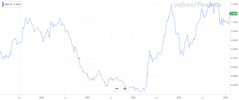- Joined
- 1 November 2007
- Posts
- 212
- Reactions
- 1
this may interest some of you,
its a credit ratings agency from china, they just released they own soverign dedt ratings, no surprise but china beat the US.
Dagong Credit Rating Agency
Happy Trading
its a credit ratings agency from china, they just released they own soverign dedt ratings, no surprise but china beat the US.
Dagong Credit Rating Agency
Happy Trading





